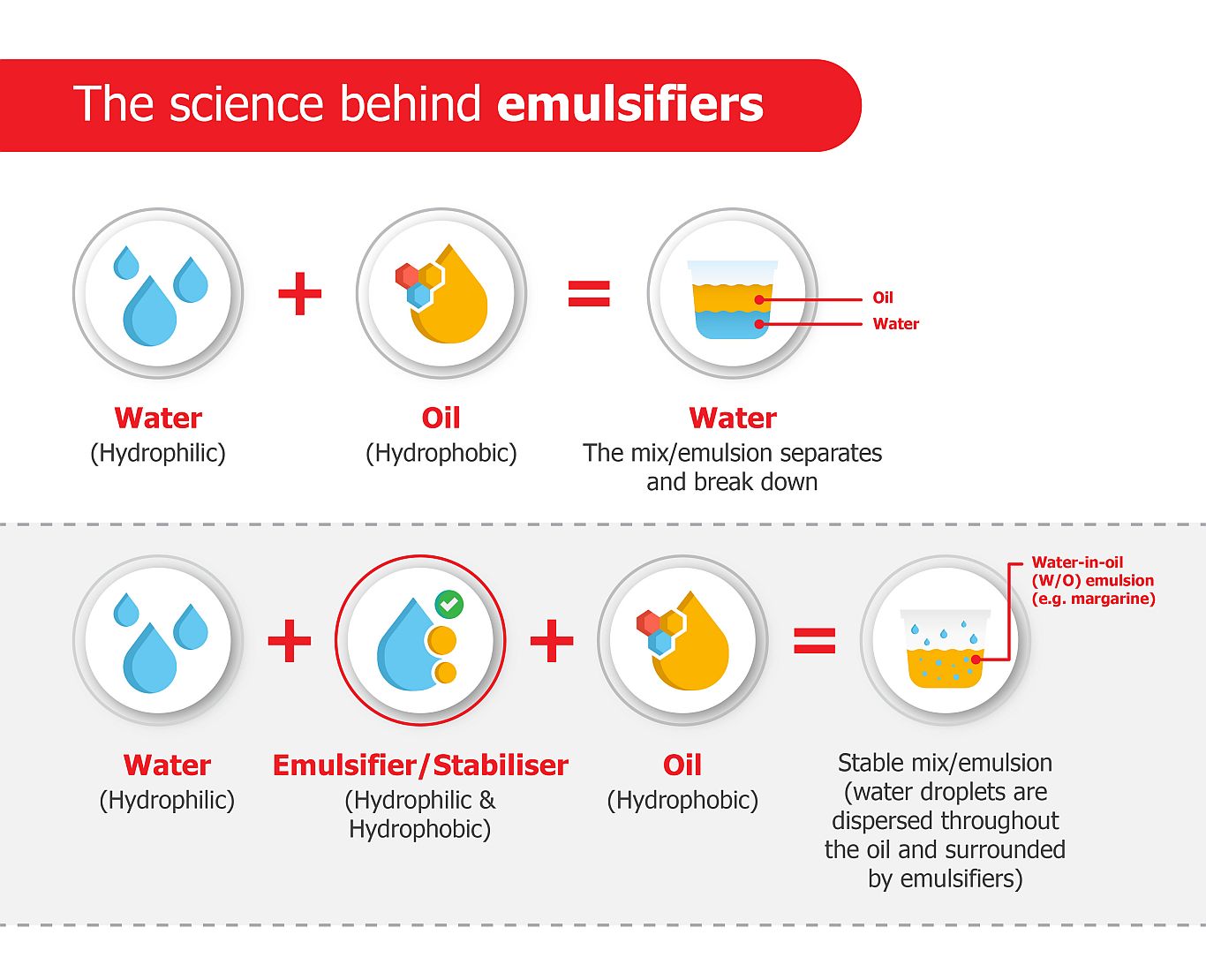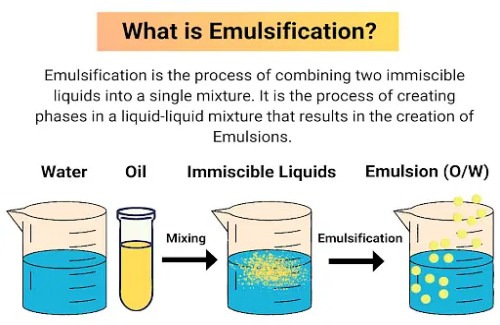The Science Behind Emulsifiers and Their Significance in Modern Manufacturing
Emulsifiers play a crucial role in modern-day manufacturing, acting as the unhonored heroes that blend oil and water for a vast variety of products. As customer preferences shift in the direction of cleaner tags, the need for ingenious emulsifiers is expanding.
What Are Emulsifiers?
Emulsifiers are essential representatives worldwide of food and item manufacturing, functioning as the glue that binds 2 or else immiscible liquids, like oil and water. You could not realize it, however these substances play an important duty in creating secure mixes. They minimize the surface tension in between these fluids, enabling them to mix seamlessly. Typical instances include lecithin discovered in egg yolks and soybeans, and mono- and diglycerides made use of in various processed foods.

When you whip up a salad dressing or enjoy a velvety treat, emulsifiers aid maintain that ideal structure. They assure your items have a consistent mouthfeel and appearance, enhancing your general experience. Without emulsifiers, lots of foods would certainly divide, bring about undesirable textures and flavors. So, next time you take pleasure in a smooth sauce or spread, bear in mind the unhonored heroes-- emulsifiers-- that make it all feasible.
The Chemistry of Emulsification
When you blend oil and water, you could discover they don't mix conveniently; that's where the chemistry of emulsification comes into play. To overcome this obstacle, emulsifiers are utilized.
These molecules have a hydrophilic (water-attracting) head and a hydrophobic (water-repelling) tail. When you include an emulsifier, its particles position themselves at the oil-water interface, reducing surface area stress and allowing the beads to mix. The emulsifier forms a safety layer around each droplet, stopping them from integrating back into different layers. Recognizing this chemistry is important for achieving security in items like dressings, creams, and sauces, making emulsification vital in modern production.
Kinds Of Emulsifiers
Different types of emulsifiers play crucial functions in stabilizing blends of oil and water. All-natural emulsifiers, like lecithin from egg yolks or soy, are obtained from plants and pets, making them preferred in food products.
On the various other hand, artificial emulsifiers, such as mono- and diglycerides, are chemically crafted to boost stability and life span. They're frequently utilized in processed foods and aesthetic items.
Additionally, you may stumble upon non-ionic, anionic, and cationic emulsifiers, each with unique properties that affect their efficiency. Non-ionic emulsifiers, for instance, job well in a broad variety of pH levels, while anionic emulsifiers often tend to do much better in alkaline conditions. Understanding these kinds can aid you choose the best emulsifier for your specific application.
Mechanisms of Solution Development
Comprehending exactly how emulsions form is necessary for developing secure blends of oil and water. Emulsions take place when you disperse little beads of one fluid into one more immiscible fluid, such as oil in water. This procedure requires power, typically provided with agitation or mixing. When you introduce an emulsifier, it minimizes the surface stress in between both fluids, enabling them to blend more quickly.
The emulsifier particles have a hydrophilic (water-attracting) head and a hydrophobic (oil-attracting) tail. When you add an emulsifier, these molecules prepare themselves at the oil-water interface. The hydrophilic heads communicate with water, while the hydrophobic tails secure right into the oil. This develops an obstacle that supports the droplets, preventing them from integrating.
Applications of Emulsifiers in Different Industries
Emulsifiers play an essential role throughout different markets, making your favorite foods smoother and a lot more delightful. In cosmetics, they boost product structure and stability, making sure a pleasurable application experience. Plus, in drugs, they help deliver vital components successfully, improving total efficiency.
Food Market Makes Use Of
While you may not recognize it, emulsifiers play an important function in the food sector, enhancing the structure, stability, and rack life of many products. In baked items, emulsifiers boost dough handling and retain moisture, resulting in a far better appearance and prolonged quality. By making sure uniformity and quality, emulsifiers are significant to supplying the delicious items you delight in every day, making them a vital active ingredient in modern food manufacturing.
Cosmetic Formulations Advantages
When it comes to aesthetic formulas, emulsifiers are important for creating products that feel extravagant and execute effectively. They help blend oil and water, ensuring a smooth and stable consistency in creams, lotions, and products. You'll discover that emulsifiers enhance product security, stopping separation and prolonging life span. This suggests you can appreciate your favorite cream without fretting regarding view it spoiling also swiftly. In addition, emulsifiers enhance the application experience, permitting also distribution and far better absorption into the skin. By using emulsifiers, you additionally accomplish an even more enticing appearance, making your cosmetics feel wonderful on your skin. Generally, emulsifiers play an important duty in delivering high-grade cosmetic items that satisfy your charm demands.
Pharmaceutical Applications Introduction
In the pharmaceutical market, emulsifiers are crucial for formulating effective drugs. You'll find emulsifiers in numerous dosage types, like creams, lotions, and fluid suspensions, enhancing the bioavailability of medicines.
The Impact of Emulsifiers on Item High Quality

By making certain steady solutions, you decrease the risk of spoilage and prolong service life, inevitably saving you time and cash. You'll also find that emulsifiers can enhance the bioavailability of active ingredients in your products, making them much more efficient for customers.
Furthermore, they enable you to create ingenious formulations that meet diverse customer demands. Whether you're crafting a creamy dressing or an elegant lotion, emulsifiers are vital for accomplishing the desired results. In brief, by understanding and leveraging the influence of emulsifiers, you can substantially raise the high quality of your products.
Future Fads in Emulsifier Advancement
As the demand for cleaner labels and lasting products rises, the growth of new emulsifiers is set to advance significantly. You'll see a shift towards plant-based and natural emulsifiers, driven by consumer choices for active ingredients that are eco-friendly and less processed. Innovations in biotechnology will likely boost the performance and efficiency of these emulsifiers, enabling producers to develop steady solutions with fewer ingredients.
You may also see a boost in multifunctional emulsifiers that not only support solutions however additionally improve taste, texture, or dietary value. This pattern can simplify active ingredient listings while boosting product efficiency.
Moreover, with breakthroughs in nanotechnology, click this emulsifiers might be crafted at the molecular level to accomplish unprecedented stability and performance. Emulsifiers. As you explore these patterns, you'll find that the future of emulsifier advancement is not nearly performance, yet also regarding welcoming sustainability and transparency in components
Regularly Asked Questions
Are Emulsifiers Safe for Usage in Food Products?
Yes, emulsifiers are generally risk-free for intake in food. They've been extensively examined and accepted by food safety authorities, so you can enjoy your preferred foods without fretting about their effect on your health and wellness.
Can Emulsifiers Be Derived From All-natural Sources?
Yes, you can obtain emulsifiers from natural resources. Ingredients like lecithin from egg yolks or soybeans and casein from milk prevail. These all-natural emulsifiers help support combinations without synthetic ingredients, making them prominent in different products.

Just How Do Emulsifiers Impact Rack Life of Products?
Emulsifiers stabilize blends, preventing separation and wasting - Emulsifiers. By maintaining uniformity, they prolong items' life span, guaranteeing quality and quality. You'll discover that emulsifiers assist maintain your favored foods and cosmetics carrying out more than time
What Are Possible Negative Effects of Emulsifiers?
You might experience digestive system issues when consuming products with emulsifiers, as they can interrupt digestive tract microorganisms. Some studies suggest prospective web links to swelling or allergic reactions, however extra study is needed to websites completely recognize these results.

Are There Alternatives to Standard Emulsifiers?
Yes, there are choices to conventional emulsifiers. You can discover options like natural gum tissues, starches, or lecithin. Each alternative offers one-of-a-kind homes, so experiment to locate what works best for your certain application.